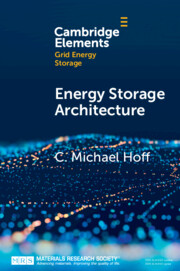Element contents
Energy Storage Architecture
Published online by Cambridge University Press: 10 June 2022
Summary
- Type
- Element
- Information
- Series: Elements in Grid Energy StorageOnline ISBN: 9781009028844Publisher: Cambridge University PressPrint publication: 07 July 2022
References
- 1
- Cited by

